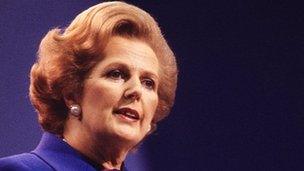Baroness Thatcher dies: Tributes paid at home and abroad
- Published

Baroness Thatcher was the first woman to be UK prime minister, winning three elections
Tributes are being paid at home and abroad to Baroness Thatcher after her death at the age of 87.
David Cameron said she had been a "great Briton", while US President Barack Obama called her a "great champion of freedom and liberty".
The funeral of the former prime minister is expected to be held next week.
The ceremony, with full military honours, will take place at London's St Paul's Cathedral.
Lady Thatcher, Britain's first female premier, was Conservative prime minister from 1979 to 1990 and won three successive general elections.
She died "peacefully" after suffering a stroke while staying at the Ritz hotel in central London. Lady Thatcher had been staying at the hotel since being discharged from hospital at the end of last year.
David Cameron: "Margaret Thatcher loved this country, and she served it with all she had"
'Patriot'
An undertaker's van carrying a silver casket left the hotel just after midnight for an undisclosed location.
She will not have a state funeral but will be accorded the same status as Princess Diana and the Queen Mother. A ceremonial funeral is one rung down from a state funeral - normally reserved for monarchs - and requires the consent of the Queen.
The union jack above Number 10 Downing Street has been lowered to half-mast, while Parliament will be recalled from its Easter recess on Wednesday to enable MPs and peers to pay tributes.
After cutting short a trip to Europe to return to London, Mr Cameron described Lady Thatcher as "the patriot prime minister" and the country's "greatest peacetime" leader.
While acknowledging that she had "divided opinion", Mr Cameron said she had "taken a country that was on its knees and made it stand tall again".
Her other successors in No 10 - Sir John Major, Tony Blair and Gordon Brown - praised her strength of character and political purpose, while Labour leader Ed Miliband said Lady Thatcher had been a "unique figure" who "reshaped the politics of a whole generation".
US President Barack Obama said "America has lost a true friend", while German Chancellor Angela Merkel said she would "never forget her part in surmounting the division of Europe and at the end of the Cold War".
But critics questioned the economic and social impact of her policies, with former Labour leader Lord Kinnock, who was defeated by her at the ballot box, saying they had been an "unmitigated disaster for Britain".
Lady Thatcher's government privatised much of Britain's state-owned industry and ushered in a new era of free market economics, a policy followed by many other governments around the world.
But her crackdown on union power and year-long stand off with the miners - coupled with mass unemployment in her first term - made her a hate figure for many on the left.
In a statement, The National Union of Mineworkers said Lady Thatcher had "set out to serve those whose interests were profit for the few" and this had led to the "decimation" of the coal industry.
During her final years in power, Lady Thatcher's government introduced the community charge, better known as the "poll tax", which led to large-scale protests.
'Great pity'
Her growing Euroscepticism alienated some cabinet colleagues and she failed to win enough support among MPs in the first round of a Conservative leadership contest against challenger Michael Heseltine. Lady Thatcher stood down and left Downing Street on 28 November 1990.
Ken Clarke, currently minister without portfolio and health secretary at the time of Lady Thatcher's resignation, told the BBC that "by the 1990s she was plainly unelectable".
Young MPs in marginal seats "threw her out because the poll tax in particular had made her so unpopular", he said.
Mr Clarke added: "She was becoming more authoritarian and they realised she couldn't win an election if she carried on in office.
"If she had retired after 10 years she would have retired in triumph. It's a great pity she hung on for another couple of years."
Small gatherings happened on Monday night in various parts of the country, notably in Glasgow, Bristol and London, with those taking part saying they were celebrating her death.
Seven police officers were injured in Bristol, where violence broke out and bins were set alight. One person was arrested on suspicion of violent disorder.
The Metropolitan Police reported low-level disturbances in Brixton, south-east London, including missiles being thrown at police. Two women were arrested on suspicion of burglary after being found inside a shop.
Lady Thatcher was born Margaret Roberts, the daughter of a shopkeeper and Conservative councillor in Grantham, Lincolnshire, in 1925. She first became an MP in 1959.
Having been education secretary, she successfully challenged former PM Edward Heath for her party's leadership in 1975 and won general elections in 1979, 1983 and 1987.
- Published8 April 2013
- Published8 April 2013
- Published8 April 2013
- Published8 April 2013
- Published9 April 2013
- Published9 April 2013
- Published8 April 2013